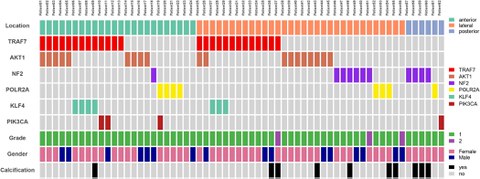Dissecting genomic intratumor heterogeneity and treatment response in progressive meningiomas
Prof. Dr. med. Tareq Juratli
The aim of our research group is to gain insights into the molecular genetic changes that underlie the development, progression and treatment resistance of brain tumours. By gaining a better understanding of these mechanisms, therapeutic strategies that are of immediate benefit to patients can be developed and optimised.
Figure 1. Summary of clinical features and molecular alterations of 62 FM meningiomas. Hua L et al. Genetic characterization and mutational profiling of foramen magnum meningiomas: a multi-institutional study. J Neurosurg. 2024
Our group has identified molecular changes in primary (gliomas, meningiomas) and secondary (metastases) brain tumours as part of extensive genomic studies. These results served as a basis for the identification of various biomarkers (tumour markers) for the purpose of monitoring and imaging (radiogenomics) of affected patients as well as for the development of targeted and locally ablative treatment options. The experimental focus of the group lies particularly on novel and already established methods for genomic characterisation using e.g. next-generation sequencing, the further development of liquid biopsy diagnostics and the use of magnetic resonance spectroscopy.
Current Research
The CAMINO project focuses on genomic heterogeneity and response to therapy in progressive meningiomas. It highlights how tumour heterogeneity can contribute to the development of resistance to standard therapies. Patient-derived organoid cultures are used to mimic the tumour microenvironment and investigate the genetic signatures under induced therapy. The aim is to identify the genomics and biomarkers associated with resistance to therapy and recurrence. By using genetic and pharmacological methods, the project aims to gain a deeper understanding of disease development and progression in order to develop targeted therapies and more accurate diagnostic methods.
The methods used include (a) establishing patient-derived organoid cultures from progressive meningioma tissues and performing drug screenings, (b) next-generation sequencing for genetic characterisation of organoid models, (c) assessment of clonal dynamics by single-cell sequencing and (d) sequencing of cell-free DNA in CSF and plasma.
- molecular and clinical characterisation of progressive meningiomas
- identification and validation of biomarkers and targeted therapies for meningiomas
Homepage Juratli Lab (AG Translationale Neuroonkologie und Schädelbasistumore)
Selected Publications
Hua L, [...] Juratli TA. Two predominant molecular subtypes of spinal meningioma: thoracic NF2-mutant tumors strongly associated with female sex, and cervical AKT1-mutant tumors originating ventral to the spinal cord. Acta Neuropathol. 2022
Juratli TA et al. Sporadic multiple meningiomas harbor distinct driver mutations. Acta Neuropathol Commun. 2021
Williams EA, [...] Cahill DP*, Ramkissoon SH*, Juratli TA*. Distinct genomic subclasses of high-grade/progressive meningiomas: NF2-associated, NF2-exclusive, and NF2-agnostic. Acta Neuropathol Commun. 2020
Williams EA, [...] Cahill DP*, Ramkissoon SH*, Juratli TA*. Frequent inactivating mutations of the PBAF complex gene PBRM1 in meningioma with papillary features. Acta Neuropathol. 2020
Juratli TA*, McCabe D*, [...] Carter SL, Cahill DP, Brastianos PK. DMD genomic deletions characterize a subset of progressive/higher-grade meningiomas with poor outcome. Acta Neuropathol. 2018


